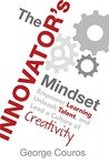
One memorable quote coming out of the Apollo 13 debacle is, "Failure is not an option!" I had a poster on my classroom wall that expressed that thought; somehow that poster became a casualty of the May 2011 EF5 tornado that carved through Joplin, probably a victim of water damage.
Regardless, when reading more and more about Growth Mindset and books that support the research of Growth Mindset, I came to believe that the idea the Failure Is Not an Option should be restated to indicate that failure should be an option after all. My thoughts in this area, of course, continue to evolve as I synthesize the things I read and experience. For example, Author George Couros points out:
A mantra that's often repeated when we talk about innovation in education is that failure is an important part of the process. In some respects, it's true. Unfortunately, this line of thinking can place a focus on the wrong aspect of the process. Those who stress the importance of failure as part of the innovation process tend to focus on failure. They'll point to stories about inventors like James Dyson, the inventor of the Dyson vacuum...
Having the freedom to fail is important to innovation. But even more important to the process are the traits of resiliency and grit. Resiliency is the ability to come back after a defeat or unsuccessful attempt. Grit is resolve or strength of character. These two characteristics need to be continuously developed as we look for new and better ways to serve our students...
...Understanding failure happens but also not accepting failure as a result is paramount in serving our students...
The problem is that people - students, parents, and educators alike - do not understand the power of experiencing failure and then blowing it away by overcoming the mistakes that resulted in failure. Too often, we accept failure as the end-all of our development. We have to change our grit in order to development more successful innovators.
Aside from concerns expressed by colleagues, you may face pushback on new ideas from your students...School can easily become a checklist for our students (complete homework, tests, rubrics, graduation requirements, etc.). In contrast to multiple choice tests, learning that focuses on creation and powerful connections to concepts not only takes more effort but also more time. Yet, if we do not challenge our students in their learning experiences, we aren't truly preparing them for the real world...The school environment is the perfect place to challenge and encourage them to stretch their thinking; and it's a safe place for them to try, fail, and try again.







































